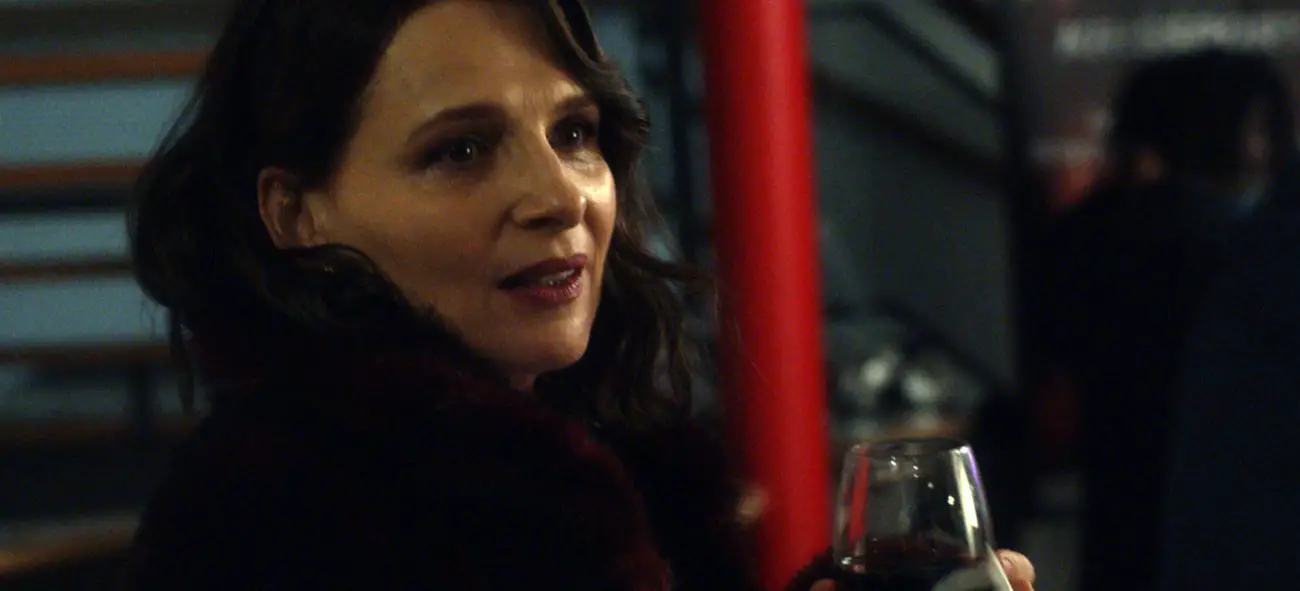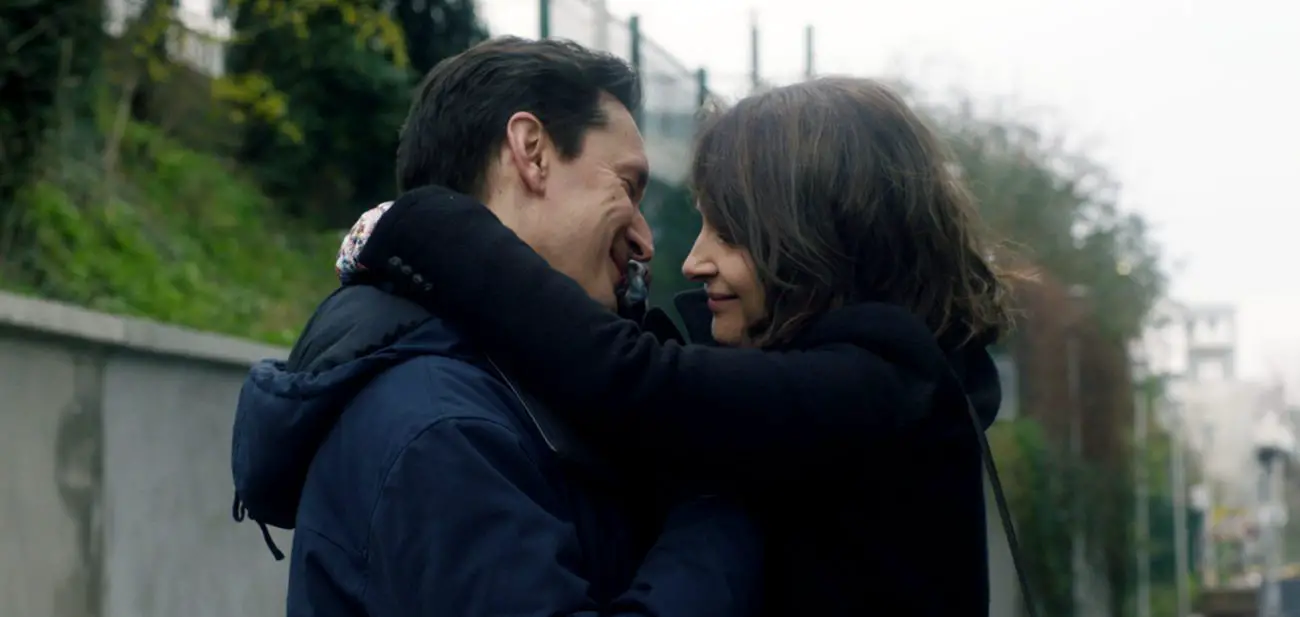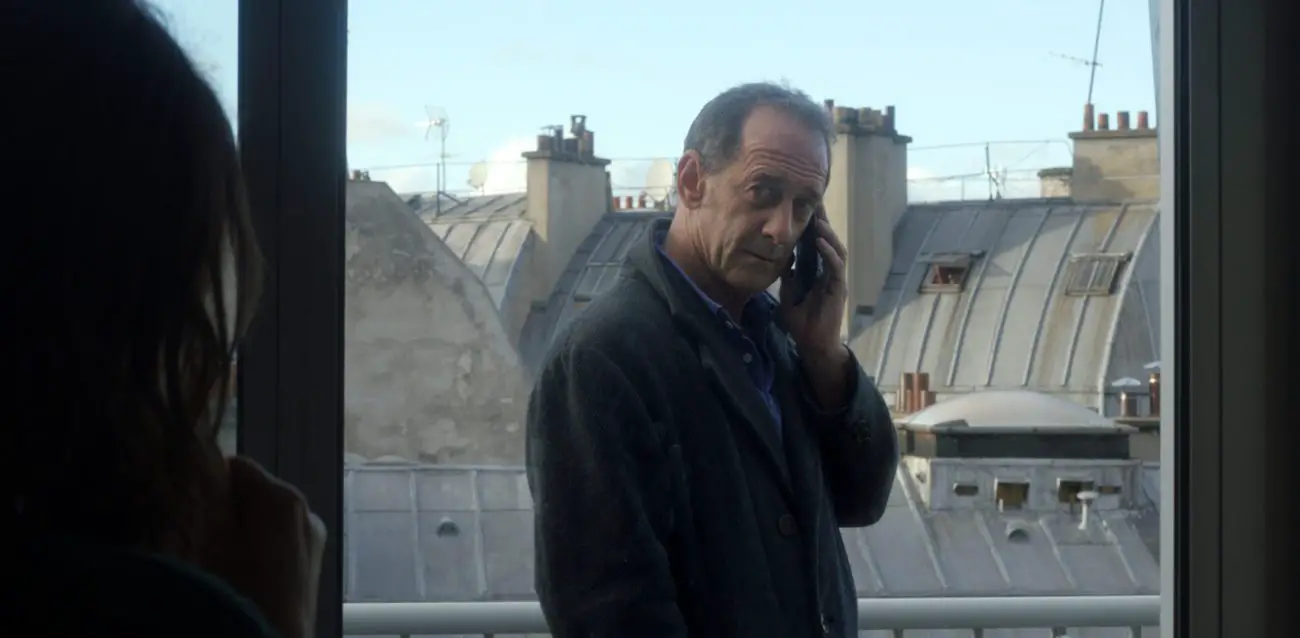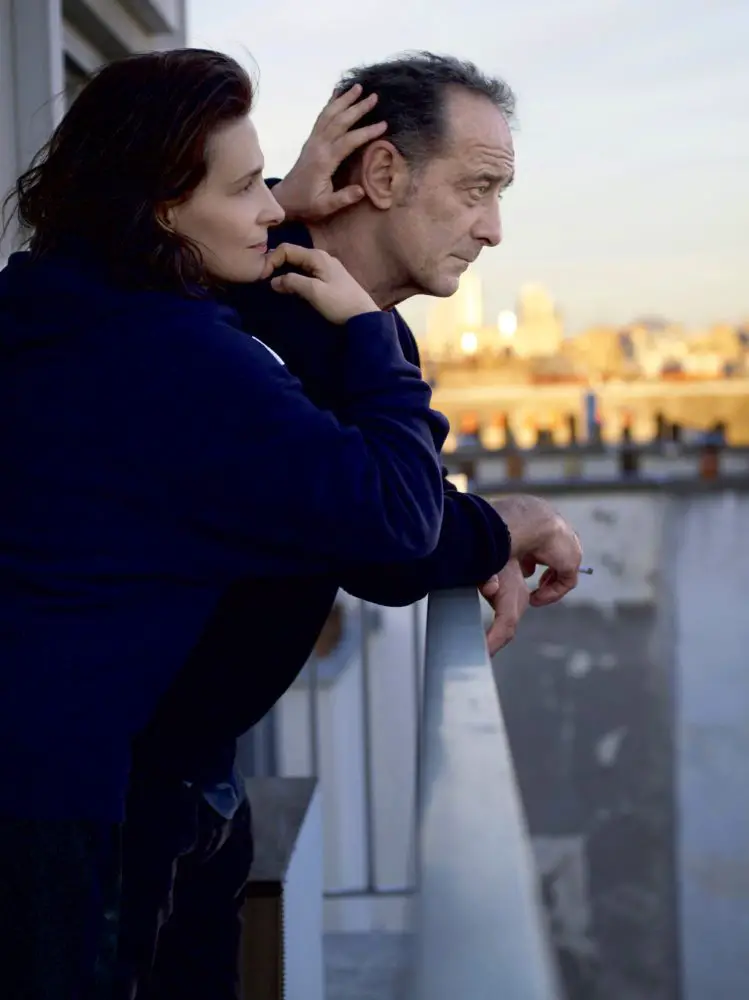There’s a key high crest amid the emotionally churned waves that comprise the Claire Denis film Both Sides of the Blade that triggers the greater descent to come. Oscar winner Juliette Binoche’s Sara has been unnerved by the reintroduction of a former flame into her life. Thinking about him at night after exchanging texts, Sara steps out of bed away from her sleeping husband and approaches a mirror nude in the dark. Staring at herself, she murmurs:
“Here we go again… love… fear… sleepless nights… phone at my bedside… getting wet…”
This is a tipping point for Sara’s plunge into temptation and one peak point of many for Juliette Binoche’s spellbinding portrayal of a woman distressed. The portending from Denis couldn’t be more clear.

For several days, Sara has known this man, named Francois and played by Opium’s Gregoire Colin, was present in her Parisian social circles, rekindling a business relationship with her husband Jean, played by Vincent Lindon of The Measure of a Man. Jean knows their sordid history has kept Sara away from him, but the two still manage to meet. Pushing their faces closer than a cordial greeting, reminiscent old cinders begin to burn. Francois longs for her and she, with this reflective midnight pep talk, submits and admits the very same.
Up to this point, every hint or mention of Francois caused Sara to physically tremble. Sara’s voyeuristic first glimpse of Francois after a decade apart creates a euphoric surprise telegraphed by a bang of a musical change in the score from the British alt-rock group Tindersticks. Wordless and conveyed only through Binoche’s physicality, we observe the rush of destructive feelings, pauses in responses caused by floods of memories. Depending on the shared history, seeing a previous lover will do that to many of us as it does to Sara.

From that catalyst moment on, the prospect of Francois gets closer. Though she tries to hide her lustful anxiety and fracturing imagination, we, the viewers of Both Sides of the Blade, know even then it would be a matter of time before the choices we see being made in that mirror scene later would come to pass. The even more difficult thing is there’s a high probability Jean knows it too.
For the character of Jean, the screenplay by Denis and writer Christine Angot (Let the Sunshine In), entertains the notion of what a spouse would do with this knowledge. Other than childhood soulmates, all married couples have raw romantic archives prior to their union. The difference lies in how well that history is resolved or buried. Solid partners have reached a point of accepting the good and the bad with trust and hope that all of it stays right where it belongs in the past. Sara is making that quite a challenge for Jean.

Vincent Lindon offers a strong leading man built on haunted redemption and devotion. Both Sides of the Blade opens with a montage of the two spouses enjoying the serenity of an ocean getaway. Jean is a caring partner of security for Sara. Every held hand, warm hug, shared kiss, and passionate lovemaking session conveys complete affection and loyalty on his part. Jean is no angel though, in that past prison time has derailed his career aspirations. Sara has been a buoyant part of his attempted comeback, but it’s clear her current feelings cloud the present greatly. So, to watch the Jean we meet beaming from the bright and wistful opening scene become equally unraveled by heavy doubt inside the constricting homelife of gray, urban, and mundane tones is quietly tragic. His silence is telling until arguments show his own fire within.

The drama of Both Sides of the Blade teeters on the prompted conversations of control mutually requested by Sara and Jean. Equal and patient communication among spouses is a must. It puts internal monologues on the record before the wrong ideas fester. Talk clears the air, even when truths are shared and lies are dropped. In Both Sides of the Blade, the line of “no need to worry” is a repeated conversation killer that dooms Sara and Jean. When those alarming thoughts are present, that’s precisely the time for more talk, not less. Hesitation helps no one.
The spine of Both Sides of the Blade are these crucial verbal bouts between Binoche and Lindon. Their unity is the heartbreaking battleground for everything else. When Denis’ film wanders away from her central pair, the tension deflates quickly. There are side plots of establishing character meant to thicken the narrative, but momentarily and repeatedly drag it down instead.
Jean has a teen son (Issa Perica of Ladj Ly’s Les Miserables) who lives with his grandmother (French great Bulle Ogier) during the pandemic quarantine, trying to figure out his life and his resentment towards his father. Francois and Jean share an athletic recruiting agency startup. However, both subplots are rather uninteresting for what are meant to be the crossroads of burned bridges. Furthermore, Sara works as a political radio host speaking with influencers on matters like racism in France and the state of Lebanon. While those details count as additional chapters of Claire Denis’ career-long influence on European identity, all of it comes and goes with little lasting consequence.
Along the same lines, so does the next level of torrid passion possible for Both Sides of the Blade. The thematic staging of which beds are empty and which ones are occupied, and by whom, carries legitimate intrigue. The content and agitation of the film positions itself as an erotic thriller. Even with enormous efforts from Binoche and Lindon and Denis’s intimate direction, the curiosity and carnality remains brittle for the marital breakage on display while not quite reaching a powerful enough melting point for the real explosion.



